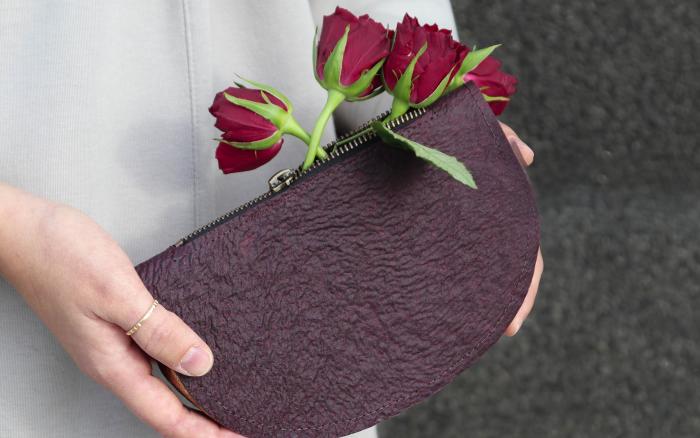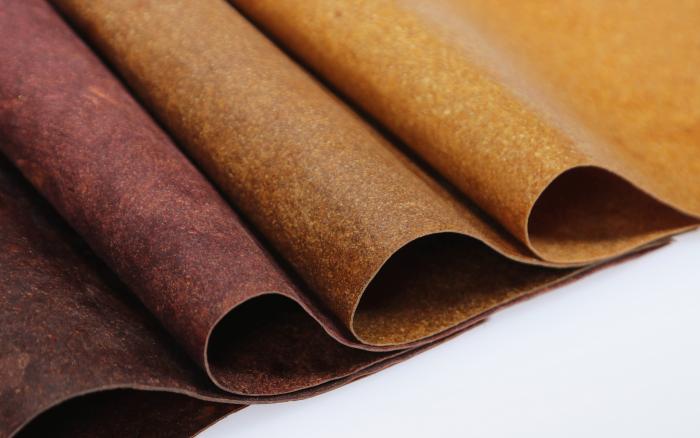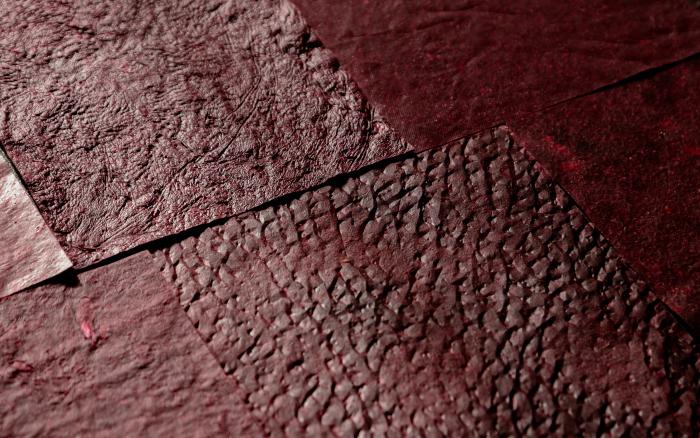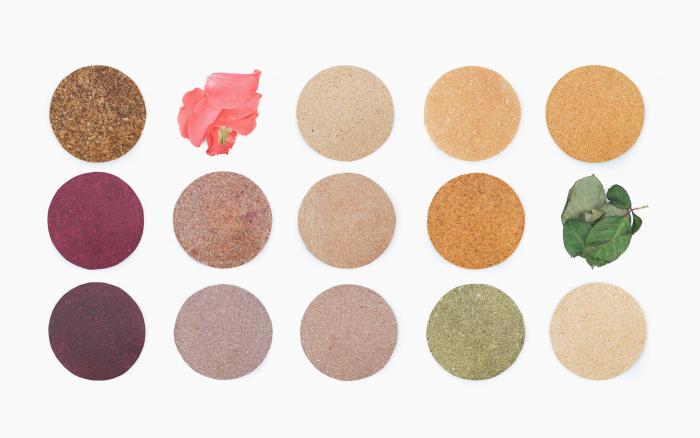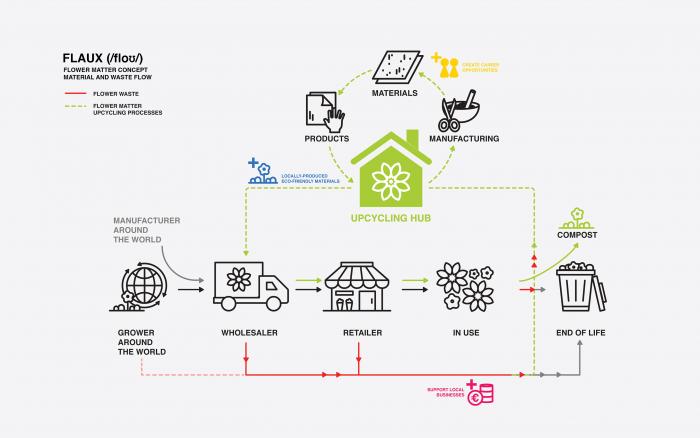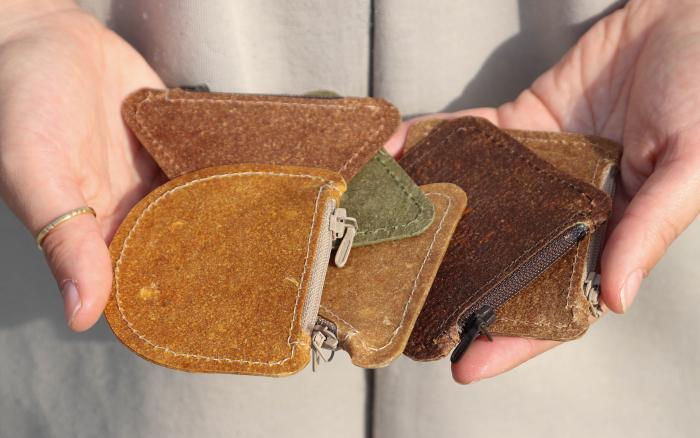About 40% of commercially grown flowers are thrown away before reaching consumers. Flower Matter is a research project aiming to divert flower waste from landfills, by directing packaging into proper recycling processes, offering alternatives to unsustainable materials and increasing circularity. Developed within this project, Flaux is an innovative textile material, a “bio-leather” made from flower petals, that could generate a positive environmental impact in the fashion industry, by replacing harmful conventional leather.
Flaux is an innovative textile material produced from flower waste resulting from a research project called ‘Flower Matter’ which is an ongoing research of ways to sustainably valorise flower waste. The project aims to provide a solution to cut this waste stream by turning flower waste into environmentally responsible materials. By integrating material production into the industry, we aim to divert flower waste from landfills, direct recyclable wastes that come with flowers into their proper recycling processes, offer alternatives for unsustainable materials and enable circularity in the industry.
Flaux contains flower petals as the main ingredient and its colour agent. Hence, no artificial colourant, no oil-based ingredient or additive is needed. The flower material is all-natural, compostable, recyclable and microplastic-free.
Flaux can be categorised as a ‘bio-leather’ or 'leather-like material’ which has the potential for textile usage. Implementing Flaux to the fashion industry could generate a positive environmental impact as we are introducing an ecological alternative to the harmful conventional leather, which is accountable for climate change. Decreasing the amount of conventional leather use also means reducing leather production, which is toxic and poisonous to workers and the communities.
The research of Flaux resulted in two higher academic researches under two EU institutions (Germany and Finland) from design and management perspectives as cited below.
- Purasachit, I. (2021) The designerly approach in material development: a design-led exploration of surplus flowers as raw material [Master’s thesis, Aalto University]. AaltoDoc. http://urn.fi/URN:NBN:fi:aalto-2021112810452
- Danapan, C. (2022) Sustainable Entrepreneurship - Circular business plan and communication strategies for a sustainable material startup 'Flower Matter’ [Unpublished Master’s thesis]. Akademie Mode & Design.
Please highlight how the concept/idea can be exemplary in this context
Various sources say 40% is the percentage of commercially grown flowers that are thrown away before they reach consumers' hands. In Finland, floral waste at wholesalers and significant retailers are 2-10% of inventory; and among smaller flower shops, the number hovers between 5 and 20%, depending on the season. In countries with higher flower traffic, such as Holland as a prominent flower exporter, the loss is even higher. Outside of the EU, a country such as Thailand generates approximately over 10 tons of waste flowers daily per one flower market.
These discarded flowers have no usage. They are thrown away with their packaging intact. Therefore, flower wastes are not considered organic and can only end up in landfills as mixed wastes or being incinerated.
Flaux, a part of the Flower Matter project, aims to divert flower waste and its non-compostable components, e.g. plastic packaging, rubber, plastic tubes, out from landfills. Our flower upcycling hub will sort out recyclable waste to their proper recycling processes whilst processing every part of flower waste into usable innovative raw materials.
Circular economy at the core - Transforming flower waste into leather-like material adds more value to biomass instead of ending up in landfills. In addition, Flaux has the potential of next-gen material and replaces conventional hazardous animal and plastic leather.
Cradle to cradle approach - Flaux is designed to be biodegradable. Therefore, after its lifespan, it is possible to reutilise or up-cycling flaux into new material such as flower paper. This approach ensures that Flaux can be truly recycled and eventually return to earth in an organic and non-toxic way.
Strive for loss of biodiversity issue - Flower waste as a feedstock means less agriculture and farming—no cattle grazing in Flower Matter's supply chain. Therefore, negative impacts such as deforestation, land degradation, and habitat loss will continuously decrease if Flaux is widely adopted
Please highlight how the concept/idea can be exemplary in this context
Generally, colour plays a vital role in creating appealing aesthetics for products and materials. However, at the moment, we are in an era where the need for more sustainable materials are rising significantly. In addition, we constantly search for natural, environmentally friendly materials to substitute the synthetic or heavily chemically processed ones. Through Flaux, we want to advocate for slow fashion whilst enhancing organic natural colour's aesthetic.
During the development of Flaux, we paid close attention to preserving the original colour of the flowers and reflecting it in the material, which results in one unique quality of Flaux. Unlike most waste-based materials that are brown or need an artificial colourant, Flaux obtains its colour directly from its raw material, i.e. flower waste, more specifically, flower petals. The colours are preserved naturally during the preparation of fresh flowers, meaning that there is no requirement for an extra step of dye extraction or any synthetic colourants involved.
Nevertheless, as the colours of Flaux come purely from such a natural source without being chemically modified, they will inevitably change over time. This is where the second topic we want to address lies.
We, consumers in modern society, tend to attach to the highly engineered properties that are made to serve human satisfactions, i.e. the precise colour customisation or the ever-lasting colour from synthetic pigments. Unfortunately, this habit leads to many products being thrown away because they are discoloured or not aesthetically satisfying.
With Flaux, we want to represent the appreciation of natural colour by encouraging the users to experience natural ageing. Therefore, instead of modifying Flaux's colour, we pay close attention to its natural changes and learn to design with them. By doing so, the colour of Flaux that changes throughout time gives a different emotional aesthetic and celebrates timeless sensations of the natural flower colour
Please highlight how the concept/idea can be exemplary in this context
Flaux as a material alone focuses more on the ecological impact. However, Flaux, together with its production, flower's cycling hub, generate a holistic practice that considers both sustainability and societal aspects. Our key objectives in terms of inclusion are listed below.
Create community engagement - we aim to build a strong community of local cut flower stakeholders where all parties engage in our upcycling system through our sustainability-oriented business model. While most waste generators usually are only seen as raw material providers of waste-based material businesses. Our purpose is to create a sustainable community where every stakeholder is involved and treated fairly and equally by Flower Matter's ethical incentives and support.
Affordability and accessibility - Flaux and all of our flower upcycling processes have been intentionally designed to be easily implemented in any location with a significant flower waste issue worldwide. Moreover, while our approach is scalable, it is still considered 'low-technology'. Having an operation that does not require high investment in advanced machinery with complex technology allows our process to accommodate all scales of waste around the world while keeping the price of Flaux at an affordable rate.
Advocate for equality - This project allows two female students soon to be entrepreneurs, to follow their dream of creating equality. Specifically, gender equality in the entrepreneurial start-ups' segment where ethnic business women are primarily underrepresented. This needs to change systematically. Moreover, coming from a manufacturing country like Thailand, we are highly aware of forced labour and child labour exploitation. Therefore, as entrepreneurs, we aim to create an equal, healthy working environment with our business structure where equality, together with transparency and traceability of our process, is our priority.
Please highlight how this approach can be exemplary
As stated above, Flaux and the concept of Flower Matter offer a novel bio-based material from flower waste to be an alternative option in the textile landscape. The implementation of Flaux and its production will add value to flower waste that is supposed to end up in landfills and enable circularity in the flower and fashion industry. Furthermore, it contributes to the community where it is located by supporting local businesses in buying their surplus flowers, creating career opportunities and feeding locally-produced eco-friendly material back into the market.
Flaux, as a material, is designed to be environmentally sustainable with its manufacturing process and functionality. Besides being a positive impact material, Flaux's aesthetic qualities (i.e. its unique colour and the grateful ageing behaviour that derived from the nature of flowers) challenge the consumer's perception of the long-lasting colour that is consequently full of chemicals and significantly toxic to human health and wellbeing.
As we believe that our project can generate an excellent impact once implemented, we must conceptualise a sustainable business at the core, meaning that we aim for a business that prioritises environmental impact and enhances the quality of life. This is why we emphasise flower upcycling hub throughout this application. Flower Matter is the key to Flaux's circularity. It also serves as a platform to unite all stakeholders within the flower sector, makes Flaux affordable and accessible worldwide and becomes a channel to advocate for quality in the workplace.
To summarise, via Flaux and Flower Matter, we anticipate waste reduction, conscious consumption elevation, carbon offsetting and other details as mentioned above which align with SDGs goals no. 12: Responsible Consumption and Production, 13: Climate Action, 15: Life on land, 9: Industry, Innovative and Infrastructure, 8 Decent work and Economy Growth and 5 Gender Equality.
Flaux compares to conventional leather - The combination of flaux's features such as the properties, biodegradability, waste as a resource, and natural organic colour can be perceived as an innovative character that has the potential of being a greener animal leather alternative. Furthermore, unlike conventional leather practice, Flaux does not require animal grazing, toxic chemicals or harmful tanning processes.
Flaux compares to leather alternatives - Many leather alternatives are polyurethane leather or composed of petroleum-based components. The more innovative options are bio-based. However, many still heavily rely on agriculture, high water consumption, and harmful pesticides, negatively affecting nature and the environment. Flaux minimises the needs of virgin materials by valorising flower waste to its best potential, which means that it is a plant-derived material with less deforestation and soil degradation.
Flower Matter compares to recycling businesses - Currently, there is no particular recycling system for flower waste. The majority of the commercial flowers are mixed with inorganic packaging, which is generally incinerated or left in landfills. In this regard, our upcycling flower hub would be the pioneer in dealing with the issue. Instead of conventionally converting waste into energy, one unique practice of our upcycling process is integrating innovative and creative thinking to further maximise the value of flower waste to the greatest extent.
Flower compares to other wastes - While some abandoned materials are particularly predominant in a specific area, the cut flower industry is globalised, meaning that flower waste is happening throughout the world. This allows our project to be internationally scaleable.
We aim to push forward this project from a concept to an impactful business.
Flaux's production of the Flower Matter has tremendous potential, which can be implemented worldwide. The business model innovation of the flower cycling hub also manifests the localism pursuit, which allows a holistic shared value creation of resources, people and community in each region before being connected globally. One of our long-term goals is to establish the flower's cycling hub in every city that needs to transform its intensive amount of flower waste into a value-added product.
For Flaux, specifically, we aim to implement the material into the fashion industry as it is one of the primary contributors to climate change. There is an urgent need for more ethical and eco-friendly sources for the fashion supply chain. In addition, a rise in consumer demand and brands' willingness to invest in next-gen materials motivates us to be a driver of a transparent and circular fashion economy.
To achieve the mentioned goal, the development of the project will be divided into two parts.
Product development - we are looking for support on R&D of Flaux (material development, standardised property tests, IPR) and elevate its production to a more commercially viable stage.
Create a network through a pilot scheme - we plan to start a small scale pilot scheme of the flower upcycling hub as our first initiative. The hub aims to test our waste sourcing system and material production. Moreover, we hope for it to be a platform that creates a network of the project's stakeholders (e.g. develop a relationship with the flower markets to establish an initial supplier network and logistics, link to potential investors or supporters via the pilot scheme data report etc.).
We aim to create a positive impact on an international level. At this stage, we are considering Thailand, where we both originated from, as a pilot location before applying the concept to Europe.
We hope to use the monetary award to support our product development and our pilot scheme operation to follow the mentioned goals, whilst Prizes' communication package is an additional channel to grow our project. Ultimately, we wish to gain enormous interest from potential investors (i.e. governor grants, VC, Angel investors etc.) to fully execute the plan.
Brief timeline
Jun - Aug 22 (with Prizes' communication package)
- Set up a management system and devise a business strategy to identify Flower Matter's pathway
- Increase the visibility of Flaux and the awareness of Flower Matter as a potential producer of the next-gen material, particularly in the cut-flower industry and fashion segment
- Connect with industry experts, NGOs, and incubators to further develop business plans and Flaux's performance
- Addressed communication plans of Flower Matter, such as actively posting on social media and increasing the engagement between Flower Matter and stakeholders
Sep-Dec 22 (with Prizes' monetary award)
- Secure the location and requirements for the pilot scheme (potentially in Bangkok, Thailand)
- Set up, execute and document the small-scale pilot scheme
- Establish relationships with the flower markets and introduce them to the business idea to establish an initial supplier network and logistics
Jan - Mar 23
- Analyse and iterate from the performance of our pilot scheme
- Potentially further develop Flaux and upcycling process or aim at IPR if they are good quality
- With an established fundamental network and operation report, we aim at efficient and ongoing professional collaboration/investment/support whilst raising environmental sustainability awareness and waste management of Flower Matter's vendors
Apr-Jun 23
- Monitor, second-analyse and iterate from previous progress
- Aim to secure professional support and funding for physical/operational necessities requirement for Flaux and Flower Matter larger-scale production.
@Purasachit, 2022
Content licensed to the European Union.
